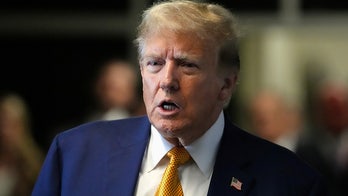Feeling the heat from Congress, oil executives on Thursday defended their soaring profits at a time of soaring gas prices and urged lawmakers to abandon a plan stripping them of billions in tax breaks.
"Don't punish our industry for doing its job well," Chevron CEO John Watson said.
Watson and other executives from the five biggest oil companies in the United States were hauled before the Senate Finance Committee Thursday morning to answer questions about their profits and treatment in the U.S. tax code. Some lawmakers are pushing a plan to end tax breaks for the biggest energy firms, claiming the companies no longer need the money.
The hearing Thursday was the scene of some tense clashes, as Democrats pressed the executives for answers and Republicans tried to soften the blow by accusing their colleagues of playing politics. Sen. Bob Menendez, D-N.J., a co-sponsor of the tax proposal, and Sen. Chuck Schumer, D-N.Y., took particular exception at a recent press release from ConocoPhillips that called the tax proposal "un-American."
Calling the argument in favor of subsidies a "fairy tale," Schumer asked ConocoPhillips CEO James Mulva whether he would apologize for the statement. After Mulva did not, Menendez asked: "Did you really mean to question my patriotism?"
Mulva said "nothing was intended to be personally directed to you" or other senators, but questioned whether the Democrats' proposal was fair.
"You're unwilling to apologize for your company's statement, okay, so I'll continue to take offense to it," Menendez shot back.
Senate Finance Committee Chairman Max Baucus, D-Mont., also said the committee needs to "scrutinize" every energy dollar, disputing claims that cutting energy subsidies could lead to higher prices and lost jobs. "Given profits of $35 billion in just the first quarter alone, it's hard to find evidence that repealing these subsidies would cut domestic production or cause layoffs," he said.
Democrats' plan would cut tax breaks for the five largest oil companies, bringing in an estimated savings of $2 billion annually. President Obama has called for these subsidies to be redirected toward alternative energy programs, but the latest plan in the Senate would use the money to help reduce the deficit.
However, the oil executives described the plan as a misguided bid to single out a few successful companies without addressing the problem of high gas prices.
ConocoPhillips CEO James Mulva said reducing the tax benefits could have significant consequences on companies' ability to compete overseas. He warned that higher taxes would allow overseas companies with lower tax obligations to outbid U.S. firms. "Unfortunately, this does impact U.S. jobs," he said, calling the proposal "unfair and unwarranted."
BP America President H. Lamar McKay said the tax changes would limit the money oil companies have for investment, not just in domestic oil production but in alternative energy like wind, biofuels and solar.
Watson and others disputed the notion that oil companies get special treatment.
"Few businesses pay more in taxes than oil and gas companies," he said, warning that the proposed changes could hurt production. He said applying the change only to the five biggest companies would be "anti-competitive and discriminatory."
The Democrats' oil company proposals have caused plenty of friction on Capitol Hill, not just between the companies and lawmakers. While House Speaker John Boehner at one point indicated a willingness to consider changing oil company tax breaks, Republicans for the most part have decried the proposal as a Democratic ploy.
"They're able to score some cheap political points against the politically unpopular oil companies," Sen. Orrin Hatch, R-Utah, said Thursday. "On the other hand, all of their sound and fury signifies nothing. It is designed to distract their constituents from the simple fact that the Democrats have no energy policy whatsoever."
Hatch warned about the consequences of targeting selected companies when their profits are high.
Hatch predicted "political theater" at Thursday's hearing, while performing a little of his own. To describe the hearing, at one point he had somebody hold up a poster showing a dog and pony. When another senator interrupted Hatch during opening remarks to ask if he was almost done, Hatch shot back: "No, I'm not through yet, and I'm not going to be through until I get through."
Republicans tried to discredit Democrats' questions at the hearing. After Schumer grilled Mulva, Sen. Pat Roberts, R-Kan., asked the executive if he was all right.
"It's very difficult to follow the unicorn from New York, who has a very sharp horn," he said, in reference to Schumer.
The hearing comes as gasoline prices are above $4 a gallon in much of the country. The national average is about $3.96 a gallon for regular unleaded, up from $2.90 a gallon a year ago, according to AAA. It's unclear when and if prices will go down. Obama, at a CBS News-sponsored town hall meeting, said he hopes the price of gas will go down significantly by summer.
"As oil prices on the world markets go down, we want to make sure that's reflected in the pump," Obama said, adding that new fuel-efficiency standards should reduce demand and in turn bring prices down.
The nonpartisan Congressional Research Service concluded that eliminating the tax breaks would be unlikely to result in higher gasoline prices, which are influenced by a host of factors. The report, released Wednesday, said eliminating the tax breaks would raise about $1.2 billion in 2012. By comparison, the five oil companies had combined revenues of $1.5 trillion, and profits of more than $76 billion, in 2010, the report said.
Menendez's bill would prohibit the five oil companies from taking a tax deduction originally aimed at boosting domestic manufacturing. The bill would also eliminate a tax break that allows oil companies to reduce their American taxes by deducting royalties paid to foreign governments.
"These subsidies were passed when the price of oil was $17 a barrel, when you needed some incentive for exploration," said Schumer. "With the price of oil at $100 a barrel, the only thing that keeps them in place is pure politics."
Thursday's hearing is unlikely to result in a consensus in Congress to repeal the tax breaks.
Obama has called for eliminating tax breaks for oil and gas companies every year since he took office in 2009, but his budget proposals have been largely ignored by Congress, even when Democrats controlled both the House and Senate. Obama's proposal would generate an estimated $4 billion a year in additional revenue.
The Associated Press contributed to this report.




